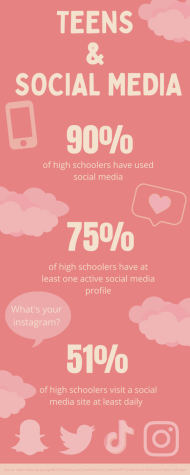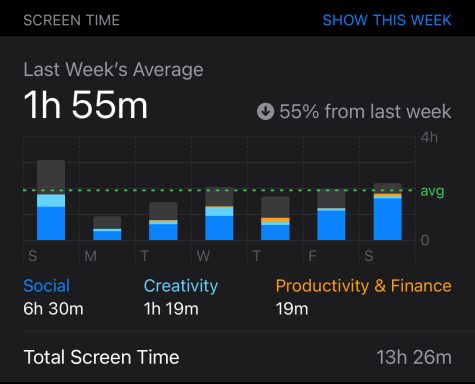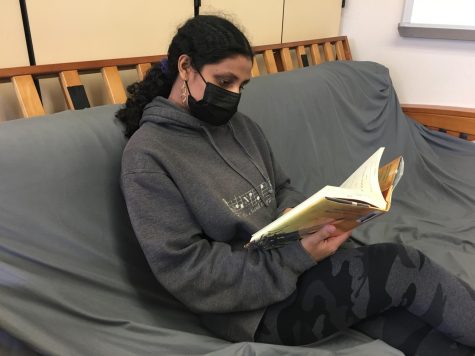Social media detox: Quitting Instagram for a week
It’s late at night. For what feels like five minutes, I’m scrolling through my Instagram explore page. A notification pops up, telling me twenty people liked my post, and when it fades away, I’m left staring at the upper right corner of the screen. Wait, it’s 2:35 AM already? And wasn’t I supposed to be studying for my math test? …Maybe it isn’t a bad idea to delete my socials for a week.

Why Quit?
Since I don’t have Tiktok, Snapchat, or other forms of social media on my phone besides Instagram, I usually spend most of my time mindlessly scrolling through different memes and reels to pass time. My new year’s resolution was to spend less time on my phone, and this was a perfect way to get started. I was also excited to see what would change in my life and how well I would adjust.
Challenges:
Immediately after deleting Instagram, the first challenge was not reinstalling it. According to David Greenfield, PhD, professor of psychiatry at the University of Connecticut and founder of the Center for Internet and Technology Addiction, “If you’re using social media addictively, you have elevated levels of dopamine, so when you stop doing that, there is some withdrawal.”
The symptoms are real – I kept picking up my phone several times a day throughout the week and aimlessly scrolling through the app menu looking for the familiar bright pink hue of the Instagram logo. When I couldn’t find what I was looking for, I would set my phone down in slight disappointment. Even without Instagram on it, my phone itself was a huge distraction when doing homework or other tasks.

Another challenge was the loss of contact. Instagram was my main way to communicate with people from school or other places when you don’t know their phone number or other way of contacting them. There were multiple times throughout the week that I had to ask people for their phone numbers so we could continue talking while I took a week off, and at a meeting I went to, they referenced their Instagram account at the end if anyone had any questions afterwards. One of my friends can only contact me through Instagram, so we had to figure out another way to communicate outside of school as well.
Without Instagram, I felt out of the loop. For a one week period, this wasn’t too much of a factor, but in the long run, not having social media would leave me feeling disconnected from society. According to a study, about 75% of young adults suffer from some degree of FOMO, or fear of missing out. Social media helps remind us that we are not alone: for every niche interest you happen to have, there will always be a like-minded community.
Benefits:

One of the main benefits of being off of social media was all the time I suddenly had on my hands. I was no longer distracting myself from doing my homework or spending hours watching reels or clicking through everyone’s stories. With all this new free time, I had more time to spend with my family and reading books. I went on walks, journaled, and kept my room organized. Being off social media made me feel more productive and relaxed.
Another benefit has been a substantial improvement in my quality of sleep. According to a study, people who check their phones frequently are more likely to have disturbances in sleep. Before deleting Instagram, I would check my phone before bed and spend between 15 minutes to 3 or 4 hours in bed just scrolling through my feed. By going straight to bed, I was able to sleep much earlier. Usually, I feel tired to the point where I’m half asleep even while walking to school, but this week, I was alert to take in the scenery around me.
Deleting Instagram has overall given me less stress and anxiety. A 2019 study of more than 6,500 teenagers found that more than three hours a day on social media may heighten risk for mental health problems. Comparing oneself to others’ online personas is a big issue of today, as it’s hard to remember that what’s shown online isn’t always reality. Not seeing others’ posts gave me more satisfaction with my life. Instead of constantly comparing myself to people online, I learned to live in the moment and enjoy what I have. Instead of staring at my phone when walking home from school, I was able to enjoy the pleasant sun on my skin and the cool breeze tickling my neck.
Reflection: What Have I Learned?
A week without any social media was a completely new experience that I will be repeating in the future. Deleting Instagram on busy weeks to give myself more time to accomplish what I want sounds appealing, but I also don’t want to feel alienated from my peers. After this week, I will be reinstalling Instagram on my phone, but I will set a timer for the app – I’ll spend less than an hour on it daily. Mainly, I need Instagram to contact people I otherwise wouldn’t. While I don’t think being social-media-free is for me, I will definitely make an effort to keep my phone switched off when it’s unnecessary in the future.
Your donation will support the student journalists in the AVJournalism program. Your contribution will allow us to purchase equipment and cover our annual website hosting costs.
